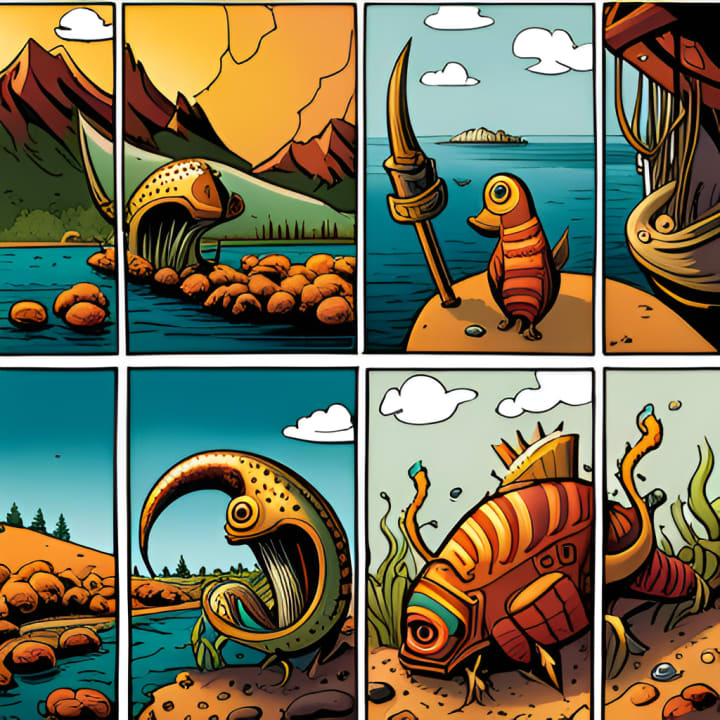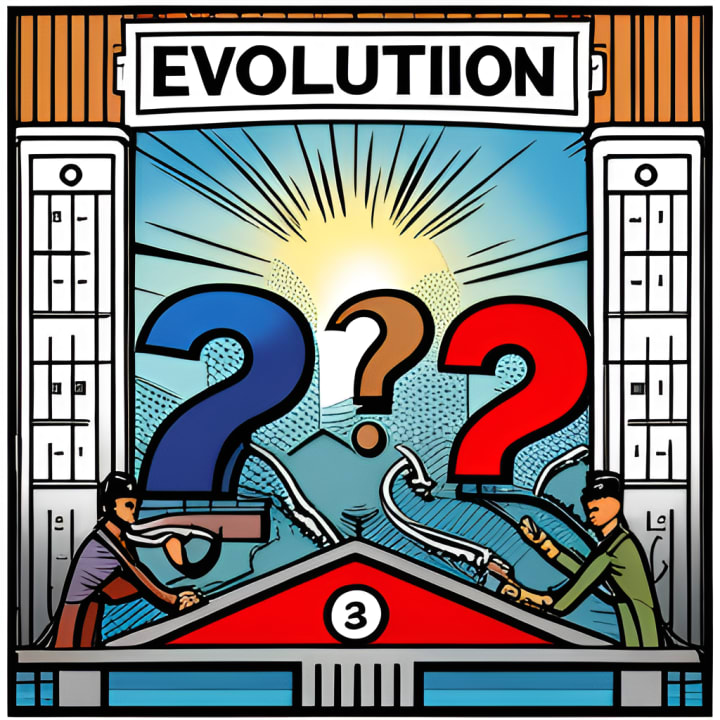The Battle of Ideas: Exploring the Most Controversial Scientific Debates
Part I: Evolution vs Creationism: The Ultimate Showdown

The timeless debate between evolution and creationism has been a contentious and widely discussed topic for centuries. Both sides present compelling arguments that have captivated the attention of people across the globe. Evolution, a well-established scientific theory, posits that all living organisms, including humans, have gradually evolved over time through a process of natural selection. This theory is supported by an extensive body of evidence from various scientific disciplines, including biology, geology, and genetics. On the other hand, creationism, rooted in religious faith, asserts that life and the universe were created by a divine being, as described in religious texts like the Bible.
The clash between these two worldviews stems from their differing approaches to understanding the origins of life. Evolution relies on empirical evidence and the scientific method to explain the complexities of life on Earth, while creationism draws upon religious beliefs and interpretations of sacred texts. This fundamental difference has led some to argue that science and religion cannot coexist harmoniously.
In approaching the evolution vs. creationism debate, it is essential to maintain an open mind and a neutral perspective. Instead of viewing the discussion as a contest between opposing forces, it is crucial to appreciate the richness of both scientific exploration and religious faith. Recognizing that science and religion often address different questions about the natural world can pave the way for a more respectful and productive dialogue.
Evolution: The Scientific Theory

Evolution stands as one of the cornerstone theories in modern biology, offering a comprehensive scientific explanation for the diversity of life on Earth. This theory, first formulated by Charles Darwin and Alfred Russel Wallace, posits that all living organisms share common ancestry and have undergone gradual changes over time.
The process of evolution involves genetic variation within populations, driven by factors such as mutations and genetic recombination. Individuals with advantageous traits, better suited to their environment, are more likely to survive and pass on their genes to the next generation through reproduction. Over countless generations, these small changes accumulate, eventually leading to the emergence of new species.
The theory of evolution draws support from a wealth of evidence collected through various scientific disciplines. Fossil records provide a window into the past, revealing the existence of ancient organisms and transitional forms. Comparative anatomy and embryology demonstrate similarities among different species, reinforcing the notion of a shared ancestry. Additionally, molecular biology and genetic studies have provided insights into the mechanisms that underlie evolutionary processes.
Despite the overwhelming evidence supporting evolution, debates and misconceptions still persist. However, the scientific community continues to reinforce the validity of evolution through ongoing research and discoveries.
Creationism: The Religious Belief

Creationism, deeply rooted in religious convictions, asserts that the universe, Earth, and all life on it were intentionally created by a divine being. This belief finds its foundation in religious texts, with different religious traditions offering their own accounts of creation.
Proponents of creationism argue that the complexity and intricacy of life cannot be adequately explained by natural processes alone. They point to the existence of irreducible complexity, suggesting that certain biological structures could not have evolved gradually and must have been designed by an intelligent creator. Creationists also highlight perceived gaps in the fossil record and other scientific evidence as supporting divine intervention.
Creationism encompasses various views, ranging from Young Earth Creationism, which holds that the Earth is only a few thousand years old, to Old Earth Creationism, which accommodates a more extended timeline while still adhering to the concept of a divine creator.
While creationism is not considered a scientific theory due to its reliance on faith rather than empirical evidence, it remains a deeply held belief for millions of individuals worldwide. Throughout history, creation stories have been fundamental to cultural and religious identity, shaping worldviews and ethical frameworks.
Acknowledging the contrasting perspectives of creationism and evolution and fostering respectful dialogue can promote a deeper understanding of different belief systems.
The Conflict Between Science and Religion

Science, driven by empirical evidence and logical reasoning, seeks to understand the natural world through observation, experimentation, and the formulation of testable hypotheses. In contrast, religion is grounded in faith, belief in a higher power, and the search for meaning and purpose.
The clash between science and religion often arises when their respective methodologies and interpretations intersect, particularly in areas related to the origin of life, the nature of the universe, and human existence. One prominent example is the conflict between the scientific theory of evolution and religious beliefs about divine creation.
Scientists widely accept evolution as a well-supported theory backed by substantial evidence from various scientific disciplines. Evolution explains the diversity of life through natural processes, such as genetic variation and natural selection. However, some religious individuals hold firmly to creationist beliefs that view life as the result of intentional divine creation.
These conflicting perspectives can lead to tension, misunderstandings, and even hostility between proponents of science and adherents of religious beliefs. The conflict arises from fundamental differences in epistemology, with science relying on empirical evidence and logical reasoning while religion draws upon faith and revelation.
However, it is important to note that the conflict between science and religion is not inevitable or universal. Many individuals and communities have found ways to reconcile these seemingly opposing worldviews, recognizing that science and religion can offer distinct, valuable insights into different aspects of human existence. By fostering open-mindedness, respectful dialogue, and an appreciation for the diversity of human thought, it is possible to find common ground and create spaces where science and religion can coexist harmoniously.
Finding Common Ground

Despite their apparent differences, science and religion can coexist and find common ground when approached with an open mind and a willingness to appreciate the unique perspectives they offer.
One way to bridge the gap between science and religion is by recognizing that they are not mutually exclusive. Science seeks to uncover the mechanisms and processes that govern the natural world, exploring how things work and providing explanations based on empirical evidence. In contrast, religion seeks to address profound questions about the purpose, meaning, and ultimate origins of existence. By understanding these distinct aims, it becomes clear that science and religion can complement rather than contradict each other.
Another avenue to finding common ground is by acknowledging that both science and religion require an element of faith. Science relies on faith in the scientific method, the belief that natural phenomena can be understood through observation, experimentation, and logical analysis. Religion, on the other hand, relies on faith in a higher power, accepting the existence of a transcendental realm beyond empirical observation. Recognizing the shared reliance on faith helps foster empathy and understanding between proponents of science and religion.
Furthermore, embracing humility is vital in bridging the gap between science and religion. Science continually evolves and expands its knowledge, uncovering new mysteries and challenging existing theories. Religion, too, recognizes the limitations of human understanding and acknowledges the vastness and complexity of the divine. By embracing humility, both scientists and religious individuals can appreciate the vastness of the unknown and remain open to new insights.
Ultimately, finding common ground between science and religion requires open dialogue, mutual respect, and an appreciation for the multifaceted nature of human experience. When approached with empathy and a willingness to understand diverse perspectives, science and religion can coexist in a way that enriches our understanding of the world and encourages intellectual growth.
In conclusion, the ongoing debate between evolution and creationism is a complex and multifaceted topic that continues to captivate the attention of people worldwide. The scientific theory of evolution, supported by a vast array of evidence from multiple scientific disciplines, provides a comprehensive explanation for the diversity of life on Earth. However, it is essential to acknowledge that creationism remains a deeply held religious belief for a significant portion of the global population.
The conflict between science and religion can be challenging to reconcile due to their differing methodologies, epistemological foundations, and interpretations of the origins of life. Science relies on empirical evidence, logical reasoning, and the scientific method, whereas religion draws upon faith, revelation, and religious texts. This fundamental difference often leads to clashes and misunderstandings between proponents of these worldviews.
Nevertheless, it is crucial to recognize that both sides of the debate have valuable perspectives to offer. Science provides a rigorous framework for understanding the natural world and has contributed immensely to advancements in various fields. On the other hand, religion offers individuals a sense of purpose, meaning, and moral guidance, addressing existential questions that science alone cannot answer.
Moving forward in a productive and harmonious manner requires finding common ground and fostering open dialogue. By embracing empathy, respect, and a willingness to listen to different perspectives, we can bridge the gap between science and religion. Engaging in respectful discussions allows us to appreciate the value of both scientific exploration and religious faith, creating space for mutual understanding and intellectual growth.
About the Creator
Dr. Fred Domezah
Join me on a captivating journey to unravel mysteries, explore scientific breakthroughs, and delve into the complexities of our planet. Get ready to be intrigued as I take you on an exciting voyage of knowledge and discovery.
Enjoyed the story? Support the Creator.
Subscribe for free to receive all their stories in your feed. You could also pledge your support or give them a one-off tip, letting them know you appreciate their work.






Comments
There are no comments for this story
Be the first to respond and start the conversation.